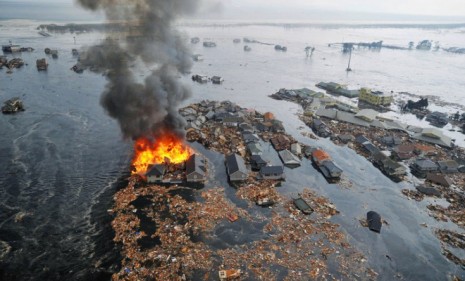Japan's earthquake: 6 financial repercussions
Could the earthquake and tsunami destroy hopes of an economic recovery in Japan — or around the world?

A free daily email with the biggest news stories of the day – and the best features from TheWeek.com
You are now subscribed
Your newsletter sign-up was successful
The massive earthquake and devastating tsunami that hit Japan on Friday also threatens a long-ailing Japanese economy, which was recently eclipsed by China, and now ranks as the world's third largest. The full effects of the disaster are still "unknown and unknowable," says Carl Weinberg of High Frequency Economics, as quoted by The Wall Street Journal. But the devastation will have serious consequences for Japanese government and businesses, and it could have ripple effects around the globe. Here, six key economic questions:
1. How much will this hurt Japan's economic recovery?
The Japanese economy was already teetering under a debt burden that is the heaviest in the industrialized world, so this disaster comes at the "worst time," says economist Nouriel Roubini, as quoted by Bloomberg News. Rebuilding the country's infrastructure will require the government to spend heavily — the 1995 earthquake in Kobe caused $132 billion in damage, says Sheila A. Smith at the Council on Foreign Relations. Japan will likely have to sell more bonds, and thus take on even more debt. One mitigating factor, says William Sposato at The Wall Street Journal, is that the earthquake "was centered in relatively rural northern Japan," and not in, say, Tokyo. Possible upside: Roubini notes that the government's reconstruction efforts could provide "a massive amount of fiscal stimulus" that could fuel a recovery.
The Week
Escape your echo chamber. Get the facts behind the news, plus analysis from multiple perspectives.

Sign up for The Week's Free Newsletters
From our morning news briefing to a weekly Good News Newsletter, get the best of The Week delivered directly to your inbox.
From our morning news briefing to a weekly Good News Newsletter, get the best of The Week delivered directly to your inbox.
2. What about the global economic recovery?
The devastation in Japan "will likely have a short-term effect on the global economy," says Alana Samuels at the Los Angeles Times, "but it won't derail the economic recovery." From a global perspective, "this is more than anything, a temporary event," says Jeffrey Landsberg, managing director of Commodore Research & Consultancy, as quoted by the Los Angeles Times.
3. What about Japanese companies?
The northern part of the country is home to car and semiconductor factories, and damage to them will certainly have an effect, says Yasuo Yamamoto, an economist at Mizuho Research Institute in Tokyo, as quoted by Reuters. "The most direct impact" of the disaster, at least economically, will likely be on major Japanese businesses that export their products around the world — companies like Honda, Toyota, and Sony, says Jill Schlesinger at BNET. If their production centers are knocked offline, or if ports remain closed for an extended period, the financial costs could mount quickly.
A free daily email with the biggest news stories of the day – and the best features from TheWeek.com
4. Will foreign companies in Japan suffer, too?
Some have already been affected, like Sweden's Volvo AB, Swiss food giant Nestlé, and pharmaceutical company GlaxoSmithKline, according to The Wall Street Journal. Economic disruptions are inevitable, says economist Richard Jerram, as quoted by The New York Times. But "many firms" took steps to protect their businesses and supply lines after the 1995 Kobe earthquake, "so the impact should be lower” this time.
5. Will this affect oil and food prices?
Maybe. Japan is the third largest importer of oil, and as Japanese refineries shut down in the wake of the disaster, lowering demand for oil, crude prices tumbled below $100 a barrel for the first time in more than a week. The area hit by the tsunami is known for growing rice, say Bettina Wassener and Chris V. Nicholson at The New York Times, though the price of the crop will probably largely be unaffected, since rice paddies hold up well when temporarily flooded by salt water. On the other hand, the closure of Japanese steel mills could reduce demand for iron ore by 20 million tons, says Landsberg in the Los Angeles Times, potentially affecting Australia's mining industry and boosting demand for steel from China.
6. How will stock markets respond?
The Asian stock markets were already slipping before the tsunami hit, but they slid even further, with Japan's Nikkei index dropping 1.7% and the Hang Seng index in Hong Kong declining 1.5%. "The market has already been hurt by high oil prices and events in the Middle East," says Myrto Sokou, a research analyst at Sucden Financial, as quoted by CNNMoney. The disaster in Japan "is likely to push equities even lower." But the U.S. markets were little changed in early morning trading. Despite all the global fears weighing on investors, they still have to focus on "how much these factors will affect U.S. GDP growth," says market strategist Steve Goldman, as quoted by CNNMoney, and the answer to that question is "not much."
-
 How to Get to Heaven from Belfast: a ‘highly entertaining ride’
How to Get to Heaven from Belfast: a ‘highly entertaining ride’The Week Recommends Mystery-comedy from the creator of Derry Girls should be ‘your new binge-watch’
-
 The 8 best TV shows of the 1960s
The 8 best TV shows of the 1960sThe standout shows of this decade take viewers from outer space to the Wild West
-
 Microdramas are booming
Microdramas are boomingUnder the radar Scroll to watch a whole movie